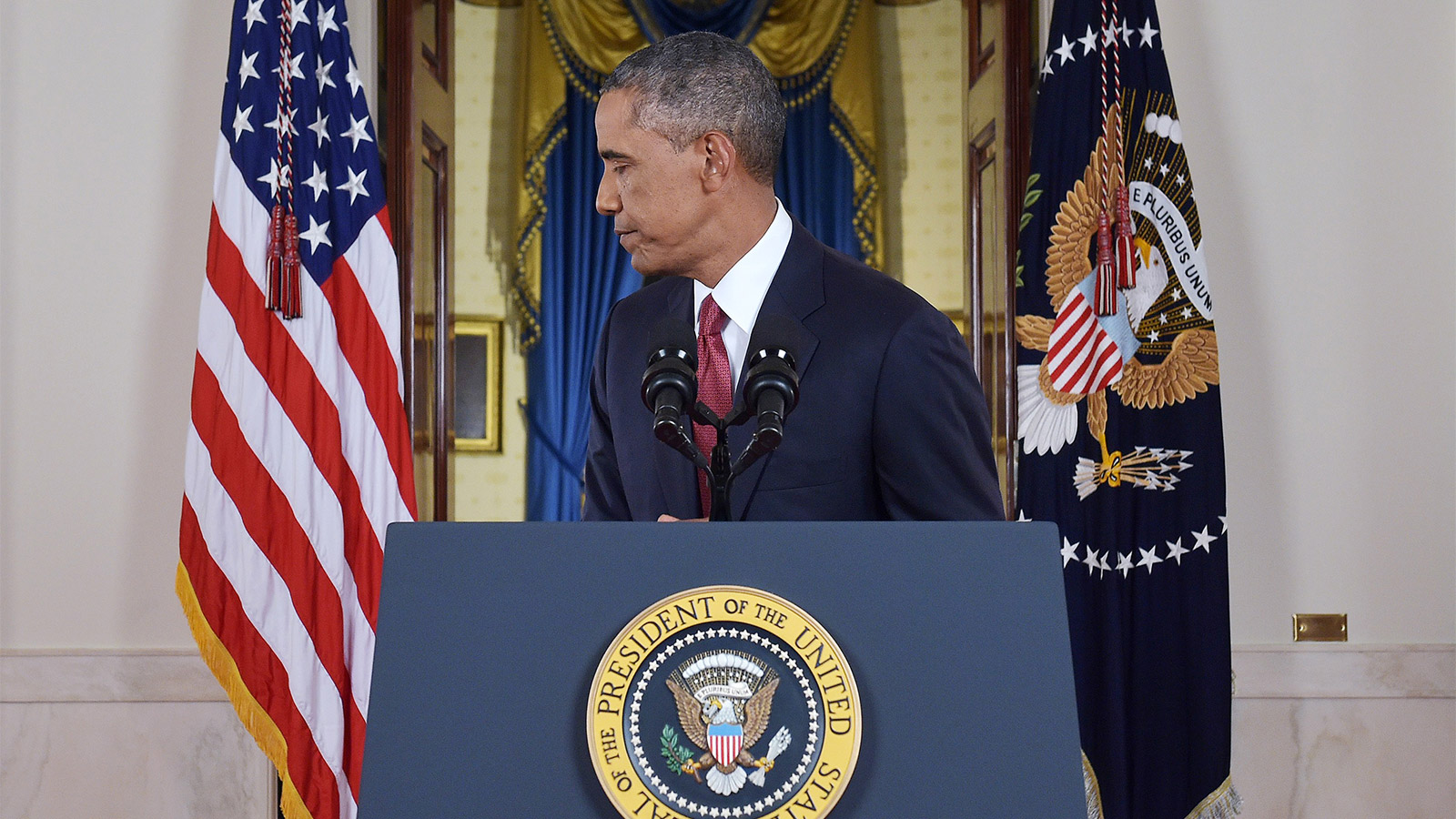Obama’s reluctant path to all-out war
After years of avoiding military action in Syria, U.S. bombs are falling again and commandos are back on the ground in the Middle East
Saul Loeb/Bloomberg/Getty Images
Share

In a little over a month, American President Barack Obama has erased any hopes he might still have clung to that his presidency will be remembered as a time when America extricated itself from wars in the Middle East.
On Aug. 8, U.S. fighter jets began bombing Islamic State, a Sunni Islamist militant group that grew out of al-Qaeda in Iraq and has, in recent months, swept through much of Syria and Iraq, sowing terror and causing thousands of ethnic and religious minorities to flee their homes. The air strikes were limited to Iraq and were at the time characterized as temporary measures to protect American diplomatic staff in the Iraqi Kurdish capital of Erbil, and to allow thousands of the religious minority Yazidi community to escape from Mount Sinjar in northwestern Iraq, where they were surrounded and feared they would be massacred. “There are no plans to expand the current air campaign beyond the current self-defence activities, Lt.-Gen. William Mayville Jr., director of operations for the Joint Staff, told reporters at the time.
This wasn’t a tenable position. War is a difficult thing to do halfway. But every stage of America’s escalation since then has revealed Obama’s reluctance to follow his decision to resume combat in Iraq to where it has inevitably led him. By Sept. 10, after Islamic State’s murders of Americans James Foley and Steven Sotloff, Obama pledged to “degrade and ultimately destroy” Islamic State, but said this campaign would not involve “American combat troops fighting on foreign soil.” Somewhere in the Pentagon, there are surely lawyers who have prepared a technically accurate but nonetheless incomprehensible argument that special forces riding shotgun beside Kurdish peshmerga fighters in northern Iraq and calling in air strikes on Islamic State targets do not meet the definition of combat troops. Men looking a lot like American commandos have already been spotted near firefights on the ground in Iraq.
But even burly soldiers with beards and an unconventional approach to uniform maintenance are unlikely to hold territory cleared of Islamic State militants by American bombs. Large numbers of ground troops of some sort will eventually be needed. Official American strategy is that Iraqis and Syrians will fill this role. But, after years of neglect by Western powers, the non-jihadist opposition in Syria—those opposed to both Islamic State and the regime of dictator Bashar al-Assad—is weak and distrustful of Washington. Iraq’s own army, despite years of American help, has shown itself unable to beat Islamic State. Only in northern Iraq, where the Kurds have carved out a semi-autonomous state, does America have a reliable Iraqi partner.
The Kurds of Syria have also established de-facto enclaves in the north of their country. America, however, has been slow to co-operate with them, because the Kurdish militias there have a close relationship with the Kurdish PKK of Turkey, which Ankara, as well as America and Canada, considers a terrorist group. This may be why American military action against Islamic State initially focused on Iraq. But Islamic State does not recognize a border between the two counties. Left alone in Syria, it spent the last few days slaughtering and ethnically cleansing thousands of Kurds near the northern city of Ayn al-Arab, also known as Kobani.
And so, last night, after years of avoiding any sort of military action in Syria, America launched air strikes at Islamic State targets there. It was joined or “supported” in these attacks by its Arab allies Jordan, Saudi Arabia, Qatar, Bahrain and United Arab Emirates.
Canadian Foreign Affairs Minister John Baird has justified Canada’s decision to confront Islamic State in Iraq but not in Syria by saying, “It’s very difficult to differentiate between the good guys and the bad guys in the [Syrian] opposition.” There is some truth to that, but it’s also a justification for inaction in which Obama could no longer afford to indulge. To “degrade and destroy” Islamic State will require war in Syria as well as Iraq. That’s what America is now engaged in.
There are critics, myself included, who believe Obama’s desire to end and avoid American military intervention in the Middle East and especially in Syria made the problems he now faces worse. Islamic State is a hideous by-product of a Syrian civil war that might have ended long ago, before the country was broken and 200,000 people died, had Washington more forcefully supported the non-jihadist opposition to Assad’s dictatorship.
Obama deserves credit now for sending Tomahawk missiles against Islamic State. The group’s victims and enemies in the region—anyone who doesn’t support its fanatical brand of Islamist jihadism and Sunni supremacy—deserve protection. And the murders of Sotloff and Foley demand vengeance. Nemo me impune lacessit, or, roughly, “No one attacks me with impunity,” the motto of Montreal’s Black Watch (Royal Highland Regiment), among others, is the first principle for any nation wishing to deter others from harming it again.
And yet it’s difficult to envision a quick or tidy end to any of this. “The tide of war is receding,” Obama used to like to say. It never really was, but the claim at least seemed credible enough to campaign on. No longer. Obama inherited wars and will bequeath them to his successor. This one is just getting started.